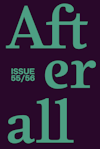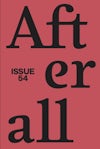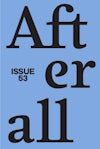
Issue 19
Autumn/Winter 2008
Editors: Charle Esche, Thomas Lawson, Mark Lewis, Dieter Roelstraete, Pablo Lafuente, Melissa Gronlund, Stacey Allan.
Founding editors: Charles Esche, Mark Lewis.
Table of contents
Foreword
Contextual Essays
- An Issue of Organisation: Chto Delat? – Gerard Raunig & Dmitry Vilensky
- Situation Wanted: Something about Labour – Marina Vishmidt
Artists
Kai Althoff
- Pictures from a Damaged Life – Alexandra Heimes
- Agonies and Ecstasies: Kai Althoff’s Dreamworks – Dieter Roelstraete
Hito Steyerl
- For a Populist Cinema: On Hito Steyerl’s November and Lovely Andrea – Pablo Lafuente
- Minor Findings and Major Tendencies – Kerstin Stakemeier
The Red Krayola
- Former Reflections Enduring Doubt – Will Bradley
- The Red Crayola/The Red Krayola: An Approachable Subject – Dustin Ericksen
Jim Shaw
- The Artless Dodger: Jim Shaw and His Endless Compendium – Claire Barliant
- Jim Shaw’s Real Mirage: A Partial Inventory – Doug Harvey
Events, Works, Exhibitons
- Early Asco: ‘Your Art Disgusts Me’ – Chon A. Noriega
- From Painting to Sculpture and Back Again (And Again, and Again): On Imi Knoebel’s Raum 19 – Wouter Davidts
- Who Writes This Shit? – Paul Elliman
Foreword
Written by Pablo Lafuente
During the spring of 1979, The Red Krayola and Scritti Politti toured together in England…
During the spring of 1979, The Red Krayola and Scritti Politti toured together in England. Despite the two bands’ very different origins and career stages at the time – The Red Krayola started in Houston in 1966 as an avant-garde psychedelic group and had by then recorded several albums, including collaborations with Art & Language, while Scritti Politti was a young English post punk band with only a few singles released – the match was perfect. As Scritti Politti member Green Gartside put it, Scritti Politti made ‘music with the questions built in and the assurances left out’. 1The Red Krayola did exactly the same.
In an interview made on the occasion of that tour and published in the music fanzine After Hours in 1979, the members of Scritti Politti discussed several concerns they had as a band. Although neither this interview nor Scritti Politti’s work was part of the editorial discussion when we chose the contents of the current issue of Afterall, they provide the ideal access point to its central issues.
…the idea is that substantial decisions about what the group is doing are made by a larger number of people than actually pick up instruments at present, and play and call themselves Scritti Politti. 2
At a time when a still buoyant art market privileges the figure of the individual producer and considers his or her work independently from the context of production, it seems important to reflect on alternative modes of making art that focus on networks and collaborations. Not only because these might provide an alternative to predominant ideas about how art can or should be made, but because these modes may make possible a more nuanced understanding of the position of both art and the artist within society at large. This results from the conviction that, as Gartside says, many of the problems raised by artistic practice ‘aren’t actually encountered at the stage of writing or performing a song per se’. Rather, the problems are located at ‘the interface between making music and the rest of your life’. The work of gelitin, Chto delat?, The Red Krayola, Asco and Kai Althoff, featured in this issue of Afterall, constitute examples of how this conviction and those problems can be reflected within contemporary artistic or cultural practice. Gelitin’s dynamics as a long-standing artists’ group, Chto delat?’s interdisciplinary production involving artists, writers and activists, The Red Krayola’s constantly changing formations and collaborations, Asco’s group performances and Kai Althoff’s numerous co-authored projects (including music albums as the group Workshop) make visible alternative modes of occupying a space within the cultural arena, and allow a questioning of the official mechanisms of distribution and interpretation. This is important because, as Scritti Politti member Nial Jinks says, ‘Music is not constructed through our intentions as musicians, but is constructed socially through the people that we come into contact with.’
Purchase
The publication is available for purchase. If you would like specific articles only, it is also available individually and to be downloaded as PDFs.
Purchase full publication
Buy via University of Chicago Press
Buy via Central Books
Purchase individual articles
Buy via University of Chicago Press





